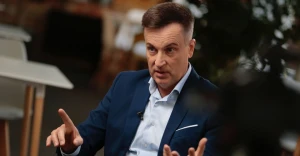
The New York Times: Putin is ready to negotiate. Column by Vitaliy Portnikov
The New York Times has claimed that Russian leader Vladimir Putin is ready to freeze the war he started with Ukraine last February
The outlet, citing its contacts with former high-ranking Russian officials and representatives of the American political establishment, emphasizes that despite the militant rhetoric that Vladimir Putin usually uses when describing the situation in Russia's war with Ukraine, he is actually sending signals of readiness to freeze the war. In fact, he is sending signals about his readiness to freeze the war at the positions currently occupied by the armed forces of Russia and Ukraine. At the same time, the outlet emphasizes that there are certain problems of perception in these signals from the Russian president, which call into question not only the intentions of the Russian political leadership, but also, of course, their sincerity.
First, the focus is on attempting to freeze the conflict. As emphasized in Russian political circles, the Russian leader appears unwilling to concede even an inch, suggesting that a frozen conflict scenario that entails Russia maintaining complete control over at least 20% of Ukrainian territory. Within American political circles, there are significant doubts regarding the existence of a Ukrainian politician willing to enter into such an agreement with Vladimir Putin.
Second, Vladimir Putin wants the United States to be the center of such negotiations, not Ukraine. That is, the Russian leader wants to negotiate his conflict freezing with Ukraine not with Ukrainians, but with Americans.
Thirdly, signals about freezing the conflict can only be a maneuver by the Russian political leader, because, as you know, Putin is a master at creating conflicts between his opponents. The very idea of freezing the conflict at a time when discussions continue about the amount of Western financial and military assistance to Ukraine, and the attention of Western governments is now focused not so much on the Russian-Ukrainian conflict as on the conflict in the Middle East. In this situation, of course, any Russian proposals may trigger discussions between Western leaders and the Ukrainian leadership, and there may be some Western politicians who will convince Kyiv that it is worth agreeing to such conditions in order not to lose even more in the event that Western support for the Ukrainian army and state begins to decline in 2024.
And, of course, we should keep in mind the situation of the presidential election in the United States. Western politicians may also be convinced that the Ukrainian leadership should take advantage of the chance to freeze the war before the theoretical possibility of former US President Donald Trump winning the next election arises.
Fourthly, there is another important point that The New York Times reminds us of, quoting Latvian President Rinkēvičs. The Latvian politician emphasizes that Russia has always been perfectly comfortable violating any agreements it has agreed to. Therefore, the maneuver might not necessarily signify an indication of the potential freezing of the Russian-Ukrainian war. Instead, it could be a strategic move to persist in the conflict and sustain the assault on Ukraine, even if temporarily halted. The achievement of an apparent compromise might be a means to pause Russia's military actions against Ukraine, creating a semblance of peace.
In this situation, of course, the question will always arise: what security guarantees will the West be willing to provide to Ukraine to ensure that Russian aggression against this country does not happen again in the near future, because today Putin may think that 20% of Ukrainian territory is enough for him, and tomorrow, as we have seen many times, he will want another 40%. Thus, it would be imprudent to assert that the Russian president would really like to end the war. However, like American journalists, we can see progress at least in the fact that Putin is now primarily concerned about the preservation of the occupied territories of Ukraine, he no longer demands a change of Ukrainian government, as he said in February 2022; he does not hope that a puppet government will emerge in Kyiv, which will be formed of traitors to the Ukrainian state, ready to support the political ambitions of the Russian leadership and betray the interests of their own state.
Putin is thus beginning to realize that he will not achieve the real goals of his so-called special operation, that he cannot hope to see the Ukrainian state disappear from the political map of the world and probably will not be able to influence the geopolitical choices of this state. But like any predator who has already captured his prey, he wants to at least keep what is now under the control of his criminal army, or at least pretend that this part of the bloody loot can satisfy him and his compatriots who are sick with an incurable chauvinistic virus. It's important to recognize that these compatriots may acquiesce to any conditions for freezing the conflict dictated by their president. It should be understood that Russian society, in discussions about ending the Russian-Ukrainian war, is not an independent actor but rather an object of political influence by its leadership. The populace is likely to accept any options put forth by Vladimir Putin and influenced by Russian propaganda.
About the author. Vitaliy Portnikov, journalist, Shevchenko National Prize winner
The editors do not always share the opinions expressed by the authors of blogs and columns.
- News













































